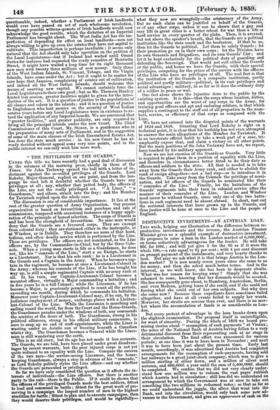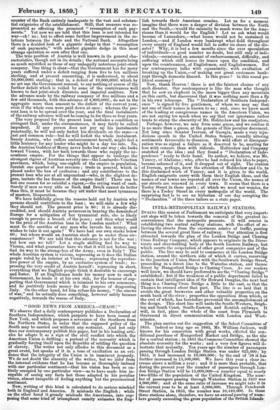DESTRUCTIVE INVESTMENTS—AN AUSTRIAN LOAN. Tins week, helping our illustration of
the difference between re- productive investments and the reverse, the Austrian Finance Minister gives us a splendid example of destructive investment. He proposes to raise a loan in the London market of 6,000,000/., on terms seductively advantageous for the lender. He will take 801. for 100!.; and will yet give 5 for the 80 as if it were the whole 100,—a rate equal to 61 per cent; with 4 per cent discount on prompt payment of the instalments, and very hearty thanks to boot. But may we ask what it is that brings Austria to the Lon- don market? It is now nearly seven years since she came to us for money, and then she asked much better terms. And in the interval, as we well know, she has been in desperate straits. What was her reason for keeping away ? Simply that she was ashamed to come, knowing that her demands would be scouted. She has consequently gone about, to Hamburg, Amsterdam, Berlin, and even Modena, getting loans if she could, and if she could not forcing what she could out of her own subjects. But why does she come now ? Because these expedients have sometimes failed altogether, and have at all events failed to supply her wants. Moreover, her straits are severer than ever, and there is no mar- ket where the accumulation of funds is so considerable as Lon- don.
But every pretext of advantage in the loan breaks down upon the slightest examination. The proposal itself is unintelligible, for want of sincerity. During the whole of 1858 we heard pro- mising stories about "resumption of cash payments" at Vienna; the notes of the National Bank of Austria having fallen to a very detrimental discount from their representing cash at no stage in their circulation. The final effort was announced for various periods ; at one time it was to have been in November ; and next it was to have been just about the present time. Early last month, accordingly, it was advertised that Austria had completed arrangements for the resumption of cash-payments, having sold her railways to a great joint-stock company, which was to give a million sterling of silver down, and a million of silver next autumn, and 600,000/. a year until the sum of 5,400,0001. should be completed. We confess that we did not very clearly under- stand how one million was to redeem the vast paper rubbish which Austria had in circulation; still less did we understand an arrangement by which the Government was at once to take out something like two millions in redeemed notes ; so that as far as we could understand the juggle, the silver that went into the Bank, and into the circulation, would only back some new ad- vances to the Government, and give an appearance of cash on the
counter of the Bank entirely inadequate to the vast and substan- tial exigencies of the establishment. Still; that measure was re- presented as effecting the promised "resumption of cash pay- ments." Yet now we are told that this loan is not intended for war—oh ! no ; but to effect some further improvement in the re- lations between the State and the National Bank. Altogether there is a decided look of a gigantic dodge in that "resumption of cash payments," with another gigantic dodge in this most strange operation so soon after that one. The true position of Austria is well known in its general cha- racteristics, though not in its details ; the national accounts being as much mystified as those of any unhappily notorious joint-stock company. One thing is clear—that the Government has for many years suffered under a deficit ranging from five to ten millions sterling, and at present amounting, it is understood, to about 10,000,000/. sterling; that is, a deficit of 10,000,0001. which by no art can the Government conceal, to say nothing of course of the further deficit which is veiled by some of the contrivances well known to fast joint-stock directors and imperial auditors. Now the advance made by the railway company of five millions and a few odd thousands, with this advance of 4,800,0001., do not in the aggregate more than amount to the deficit of the current year, even if the whole sum were paid down at once ; whereas the pre- sent loan is to be spread over the year, and the final instalments of the railway advance will not be coming in for three or four years. The very proposal for the present loan includes a condition so stringent that, under the circumstances, it may fairly be called impudent. If any person does not pay up his instalments punctually, he will not only forfeit his dividends on the same—a just and common rule—but he will forfeit the whole instalment. Surely Austria, who suffers embarrassment herself, might feel a little leniency for any lender who might be a day too late. No, the Austrian Goddess of Mercy never looks but one way ; she looks toward Vienna, with her back towards those who supply the ne- cessitous empire. For the things that appear to undergo the strongest rigour of 'Austrian severity are—the Lombardo-Venetian provinces, which, being one-eighth of the empire in population, furnish one quarter of her revenue ; trade in general, which is placed under the ban of exclusion ; and any contributors to the present loan who are at all unpunctual—who, in the slightest de- gree, imitate the lax finance of the empire itself ! There can be but one reason for so suicidal a rigour,—the crying want of cash. Surely if men so very able as Bach and Bruck cannot do better than this, it must be because they act under that most tyrannous of masters, Desperation.
We have faithfully given the reasons held out by Austria why persons should contribute to the loan ; we will state a few why they should not. The present price is 80; it is already dis- crited, and should Austria persevere in braving the demands of Europe for a mitigation of her tyrannical rule, she is likely enough to provoke a breach of the peace ; and then what would be the price of the Austrian loan in the London market? What must be the sacrifice of any man who invests his money, and wishes to take it out again? We have had our own stocks below 60; but where would an Austrian stock go to under those cir- cumstances? We are told that this advance is not for the war ; but how can we- tell ? Let a single shilling find its way to Vienna, and what guarantee have we that it will not before long find its way to the strong-box of the Army, even in Italy ? The whole Austrian system is vicious, repressing as it does the Italian people ruled by an inferior at Vienna ; repressing the reproduc- tive power of the empire, by an exclusive system of trade ; re- pressing the very credit of Austria herself; repressing in short, everything that we English people think it desirable to encourage and foster. If an Englishman lends his money now to such a Government, he lends it at his own risk, for the honour of sup- porting that Government which is inimical to his own commerce, and he positively lends money for the purpose of dragooning Italy. On the other hand, let him refuse his money, "the sinews of war," and he actually does something, however safely because negatively, towards the rescue of Italy.



































 Previous page
Previous page